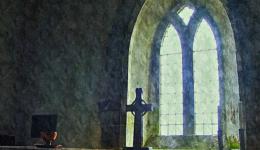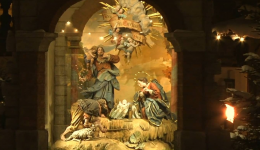Category:
We are always thrilled to hear of the birth of the baby. Conflicting emotions of joy and sorrow well up within. We want to laugh and to cry for the news of a birth stirs up a sense of oneness with others with whom we share this deeply human experience. We experience birth, life and death and the feelings are universal.
Yet at such times, there is another reality that comes in the Christmas Story for the birth of this Baby is really a link, to the past, the present and the future. It is special to have several generations of our families together; we make sure we take a picture of three or four generations who are alive at the same time. Babies link us to the past, giving us a sense of history, and to the present as they bring the next generation and continue the family name. We are reminded of stories of our ancestors’ faith and we rehearse stories of their exploits and achievements, as well as their quirks. Thus flows the present into the future, an ongoing stream of life.
The birth of John the Baptist was a unique link, for this story as it unfolds links John through his parents to all that has happened in the revelation of God in the the Old Testament. It bridges to what will be introduced in the New Testament period. It introduces us to Jesus, whose life comes to this central, pivotal generation in human history. There is nothing like it before and everything before led up to it. There has been nothing like it since but all happenings since are related to it. This story of John constitutes a link as well, connecting the work of God with everything that has gone before. It is a link between the old economy and the new, between the Old and New Covenants or Testament.. It is a link between that period of history in times past when God spoke unto the patriarchs and the people of Israel through prophets, in different ways and means and times. Now, God was about to speak to humankind more fully and finally through his Son. [See Hebrews 1].

The story shows that from the divine standpoint there is continuity, whether we can yet see it or not and the story itself is a grand link in the continuation of God self-disclosure to humanity. A link was needed because there had been a gap to be spanned: it has been nearly 400 years since the last prophet of Israel had spoken God’s Message to God’s People. There has been ‘a famine’ of hearing God’s Word. If we were to think back 400 years from the time of our reading this, what date would we find? That’s the length of time it had been since God had spoken. No wonder spiritual decline was evident in the lives of the people – not in all of them but in most. No wonder the scribes and Pharisees had had time to add to and take away from the Scriptures. And likely too, many people would be saying: “Did God really ever speak to our ancestors in history? Did he really do the things of which the ancient stories speak? Is there really a God at all, let alone a God interested in us? Sure it was all just a vision, put together by some very religious people in olden days. They just needed the superstition and the psychological crutch to get them through tough times, like the bondage and captivity times in Egypt and then in Babylon. They had given up believing in the old-time religion, even if many of them still went through the same old motions of religion, maybe for the sake of history, tradition and culture, or for the kids sake – a way of keeping families together. “We really should send them to synagogue you know into synagogue school. I had to go when I was a boy that did not do me any harm.”
Thankfully, there was still a remnant of faithful and true believers loyal to God, despite the way things had come to be. Similarly today these three breakdowns occur in our nation. There are those who thrown it all over as a lot of nonsense not to be believed in these modern or postmodern times. There are those who still see no harm in it; it is a neat kind of historical thing to do to go to church still, and do not let them tear down those quaint little country churches, and should not we have a prayer meeting again on Wednesday nights? And then there are those whose faith remains alive and vibrant, who are hoping against all the seemingly apparent evidence that God does show up, will show up again, keep on believing God and his word.
The Christmas story tells it as it was in the days of King Herod of Judea. He was Herod the Great, a descendent of Esau. Genesis 27:41 reveals to us that Esau hated Jacob, and Herod held the same contempt to the descendents of Jacob, that is Israel. Not since the captivity had the Jews had a king but now they had this man to be their king and the despised him, even hated him, for he was upon of the Roman government, a vassal king, called King more from courtesy for there was no real meaning in his kingship. Caesar was the supreme ruler of Rome and all her occupied lands.
Herod appeared to be successful as a ruler and has one who gave benefits to Israel for he had erected numerous large and beautiful buildings and even been responsible for the rebuilding of the Temple in Jerusalem. He had also polluted the land by erecting temples in honor of pagan gods, giving them equal time, and he had instituted pagan games and rights. He was terribly cruel shedding blood at every turn and at mere whim. Paranoid, he feared opposition and sought to wipe out immediately any who might oppose him now or potentially. These were the days when we read the phrase, “in the days of Herod.” The Jews were once again in bondage, treated as dirt under Roman boots, the religion tolerated but corrupted from within and without, their bloodshed at the mere whim of a heartless king or Roman soldier.
Into the darkness of this night was to shine the morning star that would prepare the way of the Lord. Turning from an immoral heartless person like Herod, we come in contrast to a pious man, a man of God, a good man named Zacharias. He was a priest. He was very old, at least for that day, at least 60 years of age, a descendent of the order Abia. Since the time of David, the priest had been divided into 24 orders and the order of Abia or Abijah was the eighth. After the exile, only a few orders had remained, and the surviving priests were again divided into 24 orders and given the original names.

Zacharias was married to Elizabeth who is also of priestly descent; a daughter of the Aaronic line, Erin being the brother of Moses. To be a priest and to be married to a priest daughter was a double, distinctive honor. The name Zacharias means, “the Lord remembers” [that is, remembers his covenant]. He had been given this name that was so full of meaning for the people, symbolic of hope in a day of despair and of faith in God’s promises in a day when the people were barely hanging on in faith in the midst of oppression. The name Elizabeth also had deep significance for it spoke of the God who is the absolutely faithful one. Her name means “the oath of God.” Likely being more than simply a name that parents loved, but perhaps describing their own deep faith, these names were given in hope and faith.
Elizabeth and Zacharias were “righteous and blameless.” This does not mean that they were sinless but that the quality of their lives was in clear contrast to the general spirit of the time. In the darkest day of apostasy, God always has a remnant, those who have “not bowed the knee to bail” as in the days of Elijah, those who live for the right when human reason, expediency, opposition and all else would call them fools. It was to this old, godly priest Zacharias that an angel of God brought a marvelous message.
The message came to Zacharias on a very important day in his life. There were thousands of priests that the time it was arranged that each week each priestly “course” would send in turn a number of priests to the Temple, therefore a week to execute their office. This week it was the turn of the course of Abia and Zacharias was one of the priests selected to serve. Daily they cast lots so as to assign the various duties for the day. Because there were so many priests it was not allowed that a priest should burn incense in the holy place more than once in his lifetime. And this day the lot had fallen to Zacharias.
The offering of incense was to be brought twice a day, early in the morning and again about three in the afternoon. During this period the people prayed outside, and as they were praying that Zacharias entered the holy place nearest the holy of holies, which was entered only once a year on the Day of Atonement. This area was lit by a seven-branched candlestick and before him Zacharias would have seen a heavy veil separating the holy place from the holy of holies. There too was a golden altar containing incense on which red coals glowed and to his right was the table of showbread, and on his left, to the south of the altar, a golden candlestick. But Zacharias must wait until a special signal indicated the moment had come to spread the incense on the altar, as near as possible to the holy of holies.
At the signal, a tinkling bell, Zacharias kindled the coals until he saw the smoke of incense rising towards heaven. He bowed in worship and reverently withdrew. But something arrested his attention. “There appeared unto him an angel of the Lord standing on the right side of the altar of incense, and when Zacharias saw him, he was troubled and fear fell upon him.” Notice how easily Saint Luke in his telling the story blends the supernatural and the natural as he relates it. He writes down the appearance of an angel with perfect naturalness as if this happened every day. The extraordinary is recorded as being quite ordinary. Why? Because Luke was writing from the Divine stand-point. These things are supernatural to us but natural to God. We cannot explain them; God does not have to. All of the history of the Bible is the history of the extraordinary touching the ordinary, of the supernatural acting upon and beyond the natural.
The angel said to Zacharias, “do not be afraid Zachariah’s for your prayer has been heard and your wife Elizabeth will bear you a son, and you will call his name John.” What sorrow it would have been for these two Hebrew parents to be childless. And now it was past the years where they could have a child. Children are a heritage from the Lord and the relies that they were God’s gift but they did not have these gifts. Was this a sign of God’s disfavor? And there was a double sadness because this would rule out them as a potential parents or ancestors of the Messiah. This was the greatest tragedy in the mind of a devout Jew. But Sacra’s prayers had been answered – in his prayer for a son, and his prayer for the salvation of the people through the sending of Messiah. This would have been part of his prayers as a priest in the Temple daily.
The name to be given the new baby was John, which means “God’s gracious gift.” From the one whose name means “God remembers,” and the one whose name means “the oath of God” was to come on baby named “God’s gracious gift.” God indeed had remembered his ancient oath and covenant with his servant Abraham that through him what all the nations of the earth be blessed. This little baby was to grow up to go before the one who would save his people from their sins and lighten everyone who comes into the world. John would go ahead to prepare the way of the Lord, looking very much like and has a right, and Old Testament specially set aside one, and he would be filled from the Holy Spirit from his birth. He would go and minister in the spirit and power of Elijah, the one of whom Malachi [the last prophet who is spoken some 400 years before] had said would come before the great and terrible day of the Lord. Said Malachi 3:1 – “behold I will send my messenger and he will prepare the way before me.” Malachi 4:5, six “behold I will send you Elijah the prophet before the coming of the great and dreadful day of the Lord; and he will turn the heart of the fathers to the children in the heart of the children to their fathers, lest I come and smite the earth with a curse.”

The angel that appeared to Zacharias graciously omitted the words of the curse at the end of Malachi’s prophecy. But this boy would be he who would prepare the way of the Messiah who would come this time not to judge but to save, not to curse but to bless. Another day, perhaps not far away, he will return in judgment – to put all things right, to curse all that would not have him reign over them, and to seal the blessing for those who will.
Matthew 11 in speaking of John the Baptist – 13, 14 – “for all the prophets and the law prophesied until John. And if you will receive it, this is Elijah who was to come. These are the words of Jesus. The Jews thought that Malachi’s prophecy meant that Elijah was to appear personally but Jesus own interpretation of this is clear – John the Baptist was the man who was to come but only in the spirit and power of Elijah, not to show up as Elijah literally. Both John and Elijah had similar traits of character marked by strength. They often lived and worked in desert places and they both pronounced divine judgments on sinners and also the call to repentance to those who are truly seeking God’s kingdom.
Zacharias sought a sign and he was given one. There was blessing and that he was answered but there was punishment because he had shown doubt as he asked. The punishment was that he was to be deaf and dumb until the birth of John. The angel Gabriel is a God’s messenger of goodness and mercy; the Angel Michael is God’s messenger of God’s wrath and judgment. John was sent to prepare the people to meet their God. God graciously sends messengers, sometimes people sometimes circumstances that worn, the call to reap membranes and repentance, that stimulate, the point backward and forward. God wants us to be prepared to receive him.









